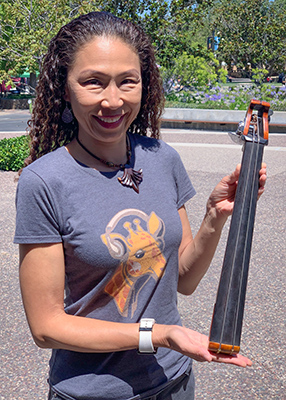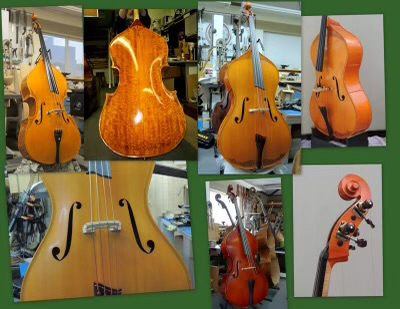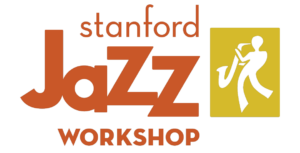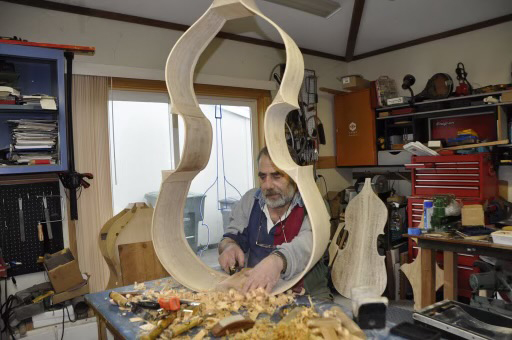Meet the Bay Area’s Wizard of Bass Repair
Master luthier Alex Friedman keeps SJW bassists up and running—and in awe of his talents
By Matthew Campbell
One of the foremost bass luthiers in the region, Alex Friedman is not only a master repairman of stringed instruments, but the designer and builder of his own line of signature, award-winning instruments. The proprietor of The Acoustic Bass Shop in San Francisco, he’s also been an invaluable, behind-the-scenes supporter of Stanford Jazz Workshop for many years, providing free loans of basses for our students’ use, timely repairs, and much more.
To hear some members of our bass faculty tell it, though, beyond all these key roles and skills, Alex’s talents seem to venture into the realm of wizardry.
“My bass was sounding great but the action was so high, it was hard to play,” said bassist and longtime SJW faculty member Josh Thurston-Milgrom, who’s had Alex handle all his repair work for more than 10 years. “And I took it to Alex and said, ‘I need you to shave the bridge down so that my action will be lower.’ And he’s like, ‘Okay, hang on a second.’ And he takes the bass, he puts his hand on the bridge and goes [makes quick tugging motion] and says, ‘Here, try this.’ The action was a million times better. So literally, in five seconds, he just put his hand on the thing and handed it to me and basically totally fixed it. It was like a millimeter’s difference.
“What it felt like is that the tiniest touch of his hand heals the bass.”
Alex himself credits the role of his hands when starting a project involving intricate work on delicate instruments. His personal maxim: “The eyes are afraid, but the hand does it.”
Informing Alex’s magic touch is a career dating back decades, from his native Ukraine and later Germany before his emigration to the U.S. From early work on pianos, he soon expanded to all stringed instruments. Being a bassist himself from age 17—the same age he built his first guitar from scratch—his eventual specialization in acoustic basses was a natural progression. His clients cite both his ingenuity and his incredible speed in addressing what may seem like complicated challenges. But in a sense, what feels like a quick fix is really the end point of a life-long process of step-by-step preparation and past lessons learned.
“I always say, before you do anything, you have to sit and think,” Alex noted. “You never ever can skip a step. Like at school, in a bass lesson: if you skip one, don’t go the next. Things don’t have to be planned, but there has to be consistency.”
Josh also praises Alex’s ability to find the simplest solution to any given bass challenge: “He’ll say, ‘Well, there are two different ways I could fix this. The fancy, complicated way is this, and I could do it, but I think if we just do this, it’ll be done ‘like that,’ and it’ll be cheap.’ And honestly, I’ve never had one of his quicker, simpler repairs come undone. They seem to last forever. He’s just the best.”
Another longtime SJW faculty member and Alex Friedman client, bassist Tomoko Funaki, brought a truly novel challenge to the master luthier: “I asked him if he can come up with some sort of practice bass,” Tomoko recounted. “For a drummer, you have a drum pad, so you can just practice while you’re in the passenger seat of a car or on a flight or anywhere. I used to travel quite a bit for work, and I was losing callus on my fingertips. And also the small muscles in the hands are very crucial for the bass. I asked him, ‘Can you come up with something like a stick with a rubber band between the edges, so I can kind of pluck the right hand as well as the left hand?’
“A few weeks later: ‘Tomoko, come over!’ So I went to his bass shop, and there is this prototype that he made from scratch. So he set up this neck—it’s basically the bass neck. He chopped up the wood and put the ebony on top. A rubber band doesn’t really work, because you need tension. So it’s got two bass strings and two pegs, so that I can just bring this anywhere. It doesn’t have the right tone or anything, but it provides mental and physical practice for me.
“So this is a piece of his artwork. And it’s number ‘01,’ because this is the prototype. I talk to bass players, and they’re like, ‘Wow, that is so cool!’ This is a great example of Alex Friedman. He’s such a creative thinker.”

Alex’s design and creation of acoustic basses has been recognized with a “Convention Favorite Honorable Mention” citation in 2011 from the International Society of Bassists. Among his original designs is a bass with a smooth body contour reminiscent of a guitar—an instrument that jazz bass maestro Christian McBride often plays when he’s performing in the Bay Area (see a sample video here).
“Beautiful! Beautiful!” was Tomoko’s enthusiastic assessment of Alex’s original basses. “Just looking at it, just feeling the body is so beautiful. It just feels right. They are gorgeous pieces.”

“They’re amazing,” Josh agreed. “He basically can make anything with his hands out of wood and metal. I don’t know too many people like that in the world these days. He’s like what you imagine would’ve been the most important guy in the village back in the day.”
SJW Executive Director David Miller underscored Alex’s importance to the Workshop on many levels. “He’s been an ally of our programs for many, many years,” David said. “He’s got a portfolio of dozens of basses in his inventory, and he’s always been glad to loan us basses every year, which has been just essential for us to run our programs. It’s hard for students to travel with full upright acoustic basses, and so we offer them to our students to use while they’re here. And we always have been able to rely on Alex to loan us basses.
“He’s also done things like fix our concert bass—troubleshooting it, installing a new pickup when one failed, tuning it up, checking the strings, checking the action. He’s really just been a great friend of the program, and a Bay Area treasure. In very meaningful ways, we could not do what we do, especially in the bass department, without his support.”
David noted that, as a lifelong student of the bass himself, Alex has also audited SJW’s Jazz Institute program multiple times. Alex spoke ecstatically of the experience: “My feedback was, ‘This is great!’ All the great musicians come here, and help the students play in combos and concerts. It’s one of the best things that happens every year in the Bay Area.”
You can learn more about Alex and his work—or inquire about bass repair or his custom instruments–on his website, acousticbassshop.myshopify.com. Or contact Alex directly at (650) 303-2333.




